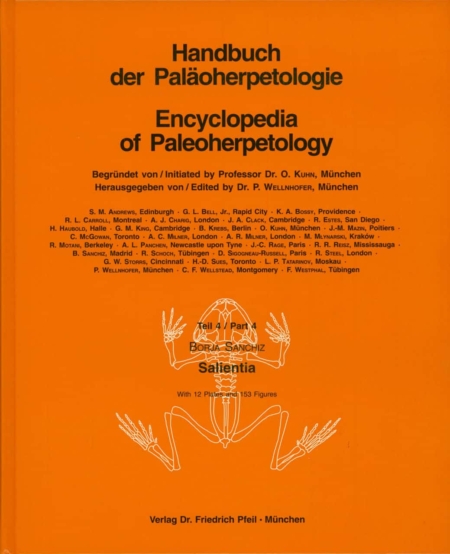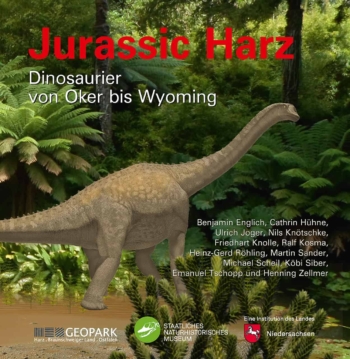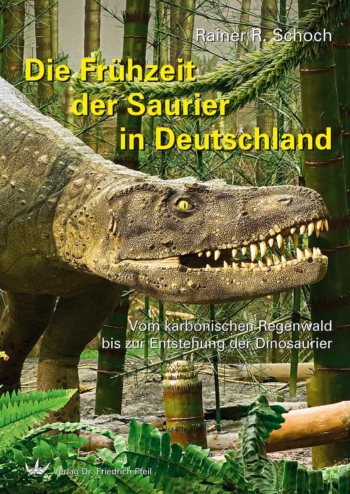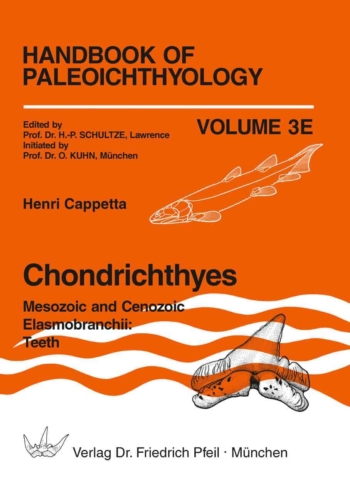This book, unlike the other volumes in this series, deals mainly with the fossil members of extant evolutionary lineages. The primary goal of this monograph is to complement the amphibian world biodiversity inventory, incorporating extinct species in an unified systematic arrangement, and providing chronological and geographical dimensions for both the extinct and living groups. Diagnoses in the taxonomic sections are of the descriptive type, including both shared primitive and derived states. The implications of the known fossil record for the current phylogenetic and evolutionary models are also briefly discussed in a separate section. A paleofaunistic section provides for each fossil locality its age, fauna, and a selection of references dealing with the site or interpretations of its taxa.
HPH 4 • Salientia
1998. [in English] – 276 pp., 153 figures, 12 plates.
25.5 x 20.5 cm, Hardcover.
Series: Handbook of Paleoherpetology
120,00 €
plus shipping costs
Preface V
Acknowledgements VI
Institutional Abbreviations VII
Historical Overview 1
Geochronology 3
Taphonomy 4
Anatomical Nomenclature and Osteology 4
Systematic Paleontology 11
Superorder Salientia LAURENTI, 1768 11
Order Proanura ROMER, 1945 11
Family Triadobatrachidae KUHN, 1962 11
Triadobatrachus KUHN, 1962 11
Order Anura RAFINESQUE, 1815 13
Suborder Discoglossoidei SOKOL, 1977 13
Family Ascaphidae FEJÉRVÁRY, 1923 13
Ascaphus STEJNEGER, 1899 13
Family Leiopelmatidae MIVART, 1869 13
Subfamily Leiopelmatinae MIVART, 1869 14
Leiopelma FITZINGER, 1861 14
Subfamily Notobatrachinae REIG, 1957 "1956" 16
Notobatrachus REIG, 1956 "1955" 16
Family Discoglossidae GÜNTHER, 1858 (1845) 18
Subfamily incertae sedis 18
Enneabatrachus EVANS et MILNER, 1993 18
Scotiophryne ESTES, 1969 19
Subfamily Gobiatinae ROCEK et NESSOV, 1993 20
Gobiates ŠPINAR et TATARINOV, 1986 20
Subfamily Alytinae FITZINGER, 1843 24
Alytes WAGLER, 1829 25
Kizylkuma NESSOV, 1981 25
Subfamily Bombinatorinae GRAY, 1825 26
Barbourula TAYLOR et NOBLE, 1924 26
Bombina OKEN, 1816 26
Subfamily Discoglossinae GÜNTHER, 1858 (1845) 27
Discoglossus OTTH, 1837 27
Eodiscoglossus VILLALTA, 1957 27
Latonia MEYER, 1843 29
Paradiscoglossus ESTES et SANCHÍZ, 1982 33
Wealdenbatrachus FEY, 1988 33
Suborder Mesobatrachia LAURENT, 1979 35
Superfamily Pipoidea FITZINGER, 1843 35
Family Palaeobatrachidae COPE, 1865 35
Albionbatrachus MESZOELY, ŠPINAR et FORD, 1984 35
Messelobatrachus WUTTKE, 1988 36
Palaeobatrachus TSCHUDI, 1838 36
Pliobatrachus FEJÉRVÁRY, 1917 39
Family Pipidae GRAY, 1825 41
Subfamily incertae sedis 41
Cordicephalus NEVO, 1968 41
Shomronella ESTES, ŠPINAR et NEVO, 1978 43
Thoraciliacus NEVO, 1968 43
Subfamily Pipinae GRAY, 1825 44
Pipa LAURENTI, 1768 44
Subfamily Xenopinae FITZINGER, 1843 44
Eoxenopoides HAUGHTON, 1931 44
Saltenia REIG, 1959 45
Shelania CASAMIQUELA, 1960 46
Silurana GRAY, 1864 46
Xenopus WAGLER, 1827 46
Family Rhinophrynidae GÜNTHER, 1859 "1858" 48
Chelomophrynus HENRICI, 1991 48
Eorhinophrynus HECHT, 1959 48
Rhinophrynus DUMÉRIL et BIBRON, 1841 49
Superfamily Pelobatoidea BOLKAY, 1919 50
Family Pelobatidae BONAPARTE, 1850 50
Subfamily incertae sedis 50
Uldzinia GUBIN, 1996 50
Subfamily Megophryinae NOBLE, 1931 51
Subfamily Pelobatinae BONAPARTE, 1850 52
Eopelobates PARKER, 1929 52
Macropelobates NOBLE, 1924 54
Pelobates WAGLER, 1830 56
Scaphiopus HOLBROOK, 1836. 57
Family Pelodytidae BONAPARTE, 1850 61
Miopelodytes TAYLOR, 1941 61
Pelodytes BONAPARTE, 1838 62
Tephrodytes HENRICI, 1994 62
Suborder Neobatrachia REIG, 1958 64
Superfamily Hyloidea WIED, 1856 64
Family Leptodactylidae WERNER, 1896 (1838) 64
Subfamily incertae sedis 64
Estesiella BÁEZ, 1995 64
Thaumastosaurus STEFANO, 1903 65
Subfamily Ceratophryinae TSCHUDI, 1838 65
Baurubatrachus BáEZ et PERí, 1990 "1989" 65
Ceratophrys WIED-NEUWIED, 1824 66
Wawelia CASAMIQUELA, 1963 67
Subfamily Leptodactylinae WERNER, 1896 (1838) 67
Leptodactylus FITZINGER, 1826 67
Subfamily Telmatobiinae FITZINGER, 1843 68
Caudiverbera LAURENTI, 1768 68
Eleutherodactylus DUMÉRIL et BIBRON, 1841 69
Eupsophus FITZINGER, 1843 70
Neoprocoela SCHAEFFER, 1949 70
Family Myobatrachidae SCHLEGEL, 1850. 71
Subfamily incertae sedis 71
Indobatrachus NOBLE, 1930 71
Subfamily Limnodynastinae LYNCH, 1971 71
Heleioporus GRAY, 1841 71
Kyarranus MOORE, 1958 72
Lechriodus BOULENGER, 1882 72
Limnodynastes FITZINGER, 1843 73
Neobatrachus PETERS, 1863 74
Philoria SPENCER, 1901 74
Subfamily Myobatrachinae SCHLEGEL, 1850 74
Crinia TSCHUDI, 1838 74
Geocrinia BLAKE, 1973 75
Pseudophryne FITZINGER, 1843 75
Family Bufonidae GRAY, 1825 75
Bufo LAURENTI, 1768 75
Peltophryne FITZINGER, 1843 84
Family Brachycephalidae GÜNTHER, 1859 "1858" 84
Family Hylidae GRAY, 1825 (1815) 84
Subfamily Hemiphractinae PETERS, 1862 84
Gastrotheca FITZINGER, 1843 84
Subfamily Hylinae RAFINESQUE, 1815 84
Acris DUMÉRIL et BIBRON, 1841 84
Hyla LAURENTI, 1768 85
Osteopilus FITZINGER, 1843. 86
Proacris HOLMAN, 1961 87
Pseudacris FITZINGER, 1843 87
Pternohyla BOULENGER, 1882 87
Subfamily Pelodryadinae GÜNTHER, 1858 88
Cyclorana STEINDACHNER, 1867 88
Litoria TSCHUDI, 1838 88
Pelodryas GÜNTHER, 1858 89
Superfamily Ranoidea FITZINGER, 1826 89
Family Ranidae GRAY, 1825 89
Subfamily Dicroglossinae ANDERSON, 1871 89
Limnonectes FITZINGER, 1843 89
Subfamily Ptychadeninae DUBOIS, 1987 "1986" 89
Ptychadena BOULENGER, 1917 89
Subfamily Raninae GRAY, 1825 89
Rana LINNAEUS, 1758 89
Family Rhacophoridae HOFFMAN, 1932 (1859) 94
Subfamily incertae sedis 94
Ranomorphus RATNIKOV, 1993 94
Subfamily Buergeriinae CHANNING, 1989 94
Buergeria TSCHUDI, 1838 94
Subfamily Rhacophorinae HOFFMAN, 1932 (1859) 95
Rhacophorus KUHL et HASSELT, 1822 95
Family Microhylidae GÜNTHER, 1858 (1843) 95
Subfamily Asterophryinae GÜNTHER, 1858 95
Australobatrachus TYLER, 1976 95
Subfamily Microhylinae GÜNTHER, 1858 (1843) 96
Gastrophryne FITZINGER, 1843 96
Microhyla TSCHUDI, 1838 96
Family incertae sedis 96
Altanulia GUBIN, 1993 96
Aralobatrachus NESSOV, 1981 97
Eorubeta HECHT, 1960 97
Lutetiobatrachus WUTTKE, 1988 97
Prosalirus SHUBIN et JENKINS, 1995 98
Theatonius FOX, 1976 98
Vieraella REIG, 1961 99
Plates 101
Synonyms 113
Nomina dubia 125
Nomina vana 135
Nomina nuda and Taxa removed from Salientia 141
Nomina nuda 141
Taxa removed from Salientia 143
Paleofaunistics 145
Fossil localities 146
Synonyms of fossil localities 181
Phylogenetic Aspects and Evolutionary Models 185
Bibliography 195
Index of Species and Genera 261
The anuran fossil record is one of the few cases in Paleoherpetology in which many of the fossils belong to taxa with living representatives, at least at the generic or familial levels. As a consequence this book, unlike the other volumes in this series, deals mainly with the fossil members of extant evolutionary lineages. The primary goal of this monograph is to complement the amphibian world biodiversity inventory that has recently been compiled (FROST, 1985; DUELLMAN, 1993b), incorporating extinct species in an unified systematic arrangement, and providing chronological and geographical dimensions for both the extinct and living groups. In order to simplify the information retrieval process, macrotaxonomic categories are resticted to a minimum, and monotypic taxa of the nomenclatural family level are not included for fossil Anura. As a consequence, a few extinct genera are left incertae sedis concerning its familar attribution. Diagnoses in the taxonomic sections are of the descriptive type, including both shared primitive and derived states, a full cladistic characterization of taxa being for the moment impossible because neontologists have not provided the necessary morphological framework. The implications of the known fossil record for the current phylogenetic and evolutionary models are also briefly discussed in a separate section.
An increasing number of scientific disciplines are using taxonomic inventories as primary data, and those studies are strongly affected by the biases that biodiversity lists might contain. Among the most important such biases, for both paleontology and neontology, is the frequent overestimation of past (or recent) diversity due to a proliferation of taxonomic names that have never been adequately documented. As will be seen later, many such names (e.g. nomina vana, nomina dubia) might be nomenclaturally correct, but I do not consider them acceptable as positive representations of distinct zoological entities. Moreover, such names cannot be synonymized with the available information. Nevertheless, this book will attempt to include all those names in appropiate sections, with enough data to facilitate their hypothetical future incorporation into the system.
A paleofaunistic section provides for each fossil locality its age, fauna, and a selection of references dealing with the site or interpretations of its taxa. I have attempted to be exhaustive in compiling the list, and as a result more than 1200 different localities have been found, from the Triassic to subfossil archaeological levels. The faunistic lists follow my own criteria, but alternative views can be found in the references provided. Obviously, a pragmatic approach has been necessary when compiling these lists, because it has been impossible to review all the described faunas. In general, all late Pleistocene and Holocene living species, if not strongly extralimital in distribution, have been accepted as valid records, but in other instances a more detailed scrutiny has been applied.
You must be logged in to post a review.
"*" indicates required fields
Related products
We’re here for you
Verlag Dr. Friedrich Pfeil
Hauptstraße 12B
5232 Bergkirchen OT Günding – Germany
Tel.: +49 8131 61 46 590
Fax: +49 8131 61 46 591
E-Mail: info@pfeil-verlag.de
Contact
Tel.: +49 89 742827-0
Fax: +49 89 7242772
E-Mail: info@pfeil-verlag.de






Reviews
There are no reviews yet.